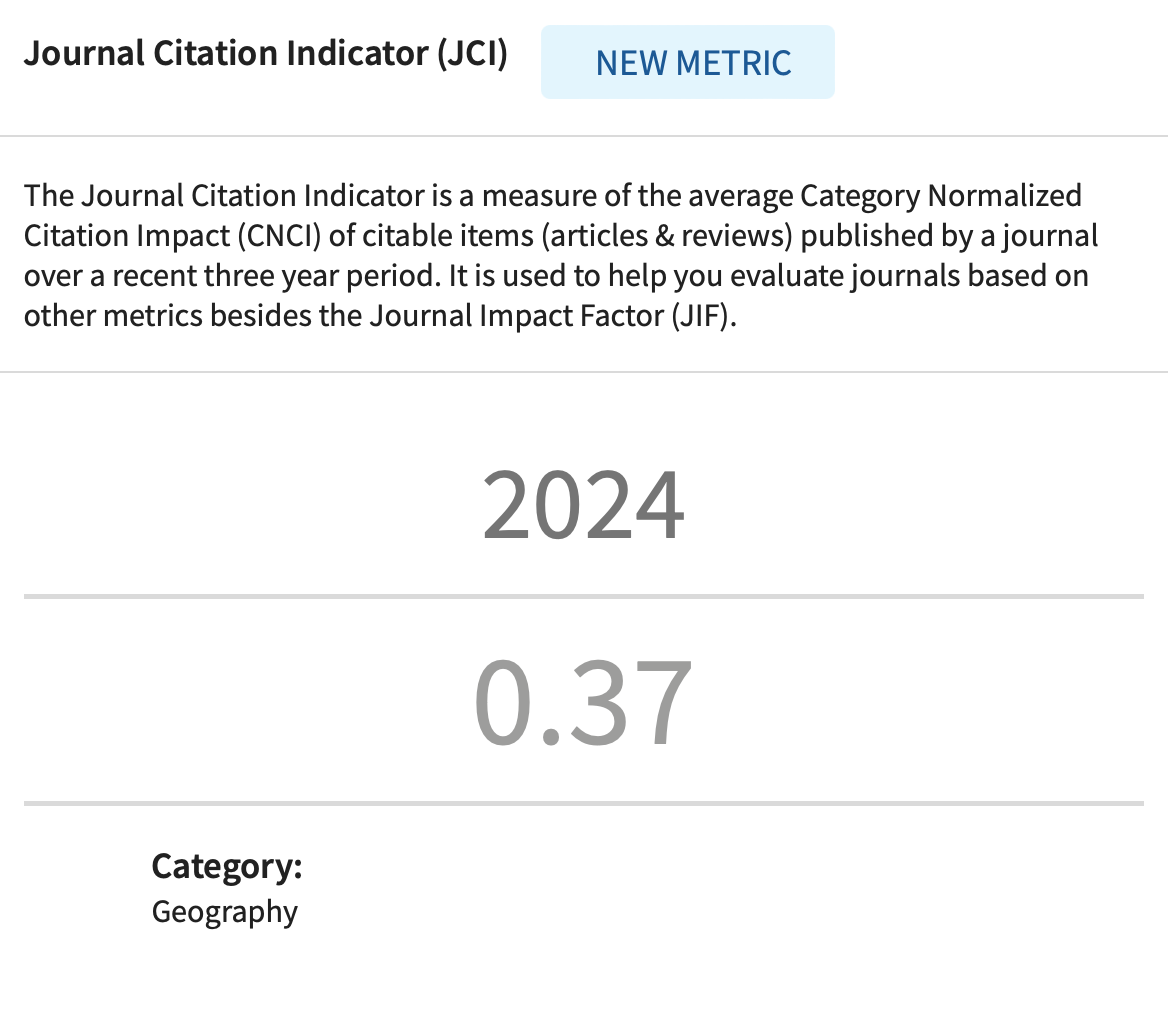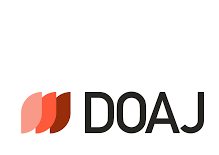MODEL OF THE LINKAGE BETWEEN LAND COVER CHANGES TO WATER DISCHARGE AND FOOD PRODUCTIVITY: THE CASE OF THE KONAWEHA WATERSHED IN INDONESIA
DOI:
https://doi.org/10.2298/IJGI2302169MKeywords:
model, land cover, water discharge, food productivityAbstract
Changes in watershed land cover have an impact on reducing water discharge, as well as other derivative impacts such as the productivity of food crops, horticulture, and plantations. This study tries to offer a conceptual model of the effect of changes in watershed land cover, water discharge, and food productivity through food crops, horticultural crops, and plantation crops. This study uses a quantitative approach based on time series data between 2002 and 2021. Data is analyzed using a structural model approach with SEM-SmartPLS software. As a result, changes in land cover have a significant effect on water discharge, but they have no effect on food productivity. Water discharge has a significant effect on food production, and changes in land cover greatly affect food productivity through the role of intermediary variables (mediation) of water discharge. In 2041, changes in land cover can reduce water discharge by around 47.9%. Then the water discharge is estimated to have an impact on the productivity of food crops by 62.3%, vegetable productivity by around 45.7%, and plantation crop productivity by around 72.7%.
Article metrics
References
Achugbu, I. C., Olufayo, A. A., Balogun, I. A., Dudhia, J., McAllister, M., Adefisan, E. A., & Naabil, E. (2022). Potential effects of Land Use Land Cover Change on streamflow over the Sokoto Rima River Basin. Heliyon, 8(7), Article e09779. https://doi.org/10.1016/j.heliyon.2022.e09779
Ağızan, S., & Bayramoğlu, Z. (2021). Comparative Investment Analysis of Agricultural Irrigation Systems. Journal of Tekirdag Agricultural Faculty, 18(2), 222–233. https://doi.org/10.33462/jotaf.745548
Amichiatchi, N. J. M. C., Soro, G. E., Hounkpè, J., Goula Bi, T. A., & Lawin, A. E. (2022). Evaluation of Potential Changes in Extreme Discharges Over Some Watersheds in Côte d’Ivoire. Hydrology, 10(6), 1–16. https://doi.org/10.3390/hydrology10010006
Andono, R., Limantara, L. M., & Juwono, P. T. (2014). Studi Penilaian Indikator Kinerja DAS Konaweha Akibat Perubahan Tata Guna Lahan Berdasarkan Kriteria Hidrologis [Assessment of Konaweha Watershed Performance Indicators Due to Changes in Land Use Based on Hydrological Criteria], Jurnal Teknik Pengairan, 5(1), 54–60. https://jurnalpengairan.ub.ac.id/index.php/jtp/article/view/204
Baco, S. L., Sinukaban, N., Purwanto, Y. J., Sanim, B., & Tarigan, S. D. (2011). Pengaruh Perubahan Penggunaan Lahan Terhadap Kondisi Hidrologi DAS Konaweha Hulu Provinsi Sulawesi Tenggara [The Effect of Changes in Land Use on the Hydrological Conditions of the Konaweha Hulu Watershed in Southeast Sulawesi Province]. Jurnal Agroteknos, 1(3), 163–172. https://adoc.pub/pengaruh-perubahan-penggunaan-lahan-terhadap-kondisi-hidrolo.html
Candar, S., Korkutal, I., & Bahar, E. (2021). Changes of Vine Water Status and Growth Parameters Under Different Canopy Managements on cv. Merlot (Vitis vinifera L.). Journal of Tekirdag Agricultural Faculty, 19(1), 1–15. https://doi.org/10.33462/jotaf.795232
Central Bureau of Statistics for Southeast Sulawesi Province. (2022). Southeast Sulawesi Province in Figures 2022. Central Bureau of Statistics. https://sultra.bps.go.id/publication/2022/02/25/b5383ab2887274d3ee7f0034/provinsi-sulawesi-tenggara-dalam-angka-2022.html
Central Bureau of Statistics for Southeast Sulawesi Province. (2016). Southeast Sulawesi Province in Figures 2016. Central Bureau of Statistics. https://sultra.bps.go.id/publication/2016/07/15/060fb0685c3ebce62b0ad4d3/provinsi-sulawesi-tenggara-dalam-angka-2016.html
Central Bureau of Statistics for Southeast Sulawesi Province. (2010). Southeast Sulawesi Province in Figures 2010. Central Bureau of Statistics. https://sultra.bps.go.id/publication/2011/04/08/e76d6b4c86171fa275c1e497/sulawesi-tenggara-dalam-angka-2010.html
Central Bureau of Statistics for Southeast Sulawesi Province. (2005). Southeast Sulawesi Province in Figures 2005. Central Bureau of Statistics. https://sultra.bps.go.id/publication/2009/01/01/23f3ebf246dce0c3f509e571/sulawesi-tenggara-dalam-angka-2005-2006.html
Central Bureau of Statistics for Southeast Sulawesi Province. (2002). Southeast Sulawesi Province in Figures 2002. Central Bureau of Statistics. https://sultra.bps.go.id/publication/2003/08/01/3cd3b89bf83686c8b1009351/sulawesi-tenggara-dalam-angka-2002.html
Corbin, J., & Strauss, A. (2015). Basics of Qualitative Research (4th ed.). Sage Publications Ltd.
Creswell, J. W. (2014). Research design: Qualitative, quantitative, and mixed methods approaches (4th ed). SAGE Publications.
Farid, M., Pratama, M. I., Kuntoro, A. A., Adityawan, M. B., Rohmat, F. I. W., & Moe, I. R. (2022). Flood Prediction due to Land Cover Change in the Ciliwung River Basin. International Journal of Technology, 13(2), 356–366. https://doi.org/10.14716/ijtech.v13i2.4662
Gashaw, T., Tulu, T., Argaw, M., & Worqlul, A. W. (2018). Modeling the hydrological impacts of land use/land cover changes in the Andassa watershed, Blue Nile Basin, Ethiopia. Science of the Total Environment, 619–620, 1394–1408. https://doi.org/10.1016/j.scitotenv.2017.11.191
Geospatial Information Agency. (2022). Indonesia/Southeast Sulawesi (Topographic map, 1:25,000). Retrieved July 5, 2022 from https://geoportal.big.go.id/#/viewer
Guo, X., Ye, J., & Hu, Y. (2022). Analysis of Land Use Change and Driving Mechanisms in Vietnam during the Period 2000–2020. Remote Sensing, 14(7), Article 1600. https://doi.org/10.3390/rs14071600
Gyawali, B., Shrestha, S., Bhatta, A., Pokhrel, B., Cristan, R., Antonious, G., Banerjee, S., & Paudel, K. P. (2022). Assessing the Effect of Land-Use and Land-Cover Changes on Discharge and Sediment Yield in a Rural Coal-Mine Dominated Watershed in Kentucky, USA. Water, 14(4), Article 516. https://doi.org/10.3390/w14040516
Hair, J. F., Ringle, C. M., & Sarstedt, M. (2011). PLS-SEM: Indeed a Silver Bullet. Journal of Marketing Theory and Practice, 19(2), 139–152. https://doi.org/10.2753/MTP1069-6679190202
Hasddin, H. (2019). Karakteristik Sumberdaya Alam dan Rencana Pengelolaan DAS Tiworo Kabupaten Muna Barat [Characteristics of Natural Resources and Management Plan for the Tiworo Watershed, West Muna Regency]. Jurnal Aksara Public, 3(2), 149–159. http://aksarapublic.com/index.php/home/article/view/216/213
Heryani, N., Kartiwa, B., Sosiawan, H., Rejekiningrum, P., Adi, S. H., Apriyana, Y., Pramudia, A., Yufdy, M. P., Tafakresnanto, C., Rivaie, A. A., Suratman, S., Dariah, A., Malik, A., Yusuf, Y., & Setiani, C. (2022). Analysis of Climate Change Impacts on Agricultural Water Availability in Cimanuk Watershed, Indonesia. Sustainability, 14(23), Article 16236. https://doi.org/10.3390/su142316236
Horton, A. J., Triet, N. V. K., Hoang, L. P., Heng, S., Hok, P., Chung, S., Koponen, J., & Kummu, M. (2022). The Cambodian Mekong floodplain under future development plans and climate change. Natural Hazards and Earth System Sciences, 22(3), 967–983. https://doi.org/10.5194/nhess-22-967-2022
Isgin, T., & Kara, F. O. (2015). Impacts of the Harran Plain Irrigation Projects on the well-being of Local Cotton Farmers Operating in the Sanliurfa Province of Turkey: Income Distribution Revisited. Journal of Agricultural Sciences, 21(4), 483–491. https://doi.org/10.1501/Tarimbil_0000001351
Konawe Regency. (2021). Peraturan Daerah (PERDA) Kabupaten Konawe Kepulauan Nomor 2 Tahun 2021 tentang Rencana Tata Ruang Wilayah Kabupaten Konawe Kepulauan Tahun 2021-2041 [Regional Regulation (PERDA) of Konawe Islands Regency Number 2 of 2021 concerning the Spatial Plan for the Konawe Islands Regency for 2021-2041]. https://peraturan.bpk.go.id/Home/Details/227059/perda-kab-konawe-kepulauan-no-2-tahun-2021
Latue, P. C., & Rakuasa, H. (2023). Spatial Dynamics of Land Cover Change in Wae Batu GantungWatershed, Ambon City, Indonesia. International Journal of Scientific Multidisciplinary Research, 1(3), 117–130. https://doi.org/10.55927/ijsmr.v1i3.3623
Li, L., & Wang, Y. (2016). Land Use/Cover Change from 2001 to 2010 and its Socioeconomic Determinants in Guangdong Province, A Rapid Urbanization Area of China. Journal of Agricultural Sciences, 22(2), 275–294. https://doi.org/10.1501/Tarimbil_0000001387
Marhaento, H., Booij, M. J., & Hoekstra, A. Y. (2018). Hydrological response to future land-use change and climate change in a tropical catchment. Hydrological Sciences Journal, 63(9), 1368–1385. https://doi.org/10.1080/02626667.2018.1511054
Marwah, S. (2014). Analisis Perubahan Penggunaan Lahan dan Ketersediaan Sumberdaya Air di DAS Konaweha Propinsi Sulawesi Tenggara [Analysis of Changes in Land Use and Availability of Water Resources in the Konaweha Watershed, Southeast Sulawesi Province]. Jurnal Agroteknos, 4(3), 208–218. https://www.neliti.com/publications/244543/analisis-perubahan-penggunaan-lahan-dan-ketersediaan-sumberdaya-air-di-das-konaw#cite
Mathewos, M., Lencha, S. M., & Tsegaye, M. (2022). Land Use and Land Cover Change Assessment and Future Predictions in the Matenchose Watershed, Rift Valley Basin, Using CA-Markov Simulation. Land, 11(10), Article 1632. https://doi.org/10.3390/land11101632
Ministry of Environment and Forestry. (2022). Penutupan Lahan Kawasan Hutan (A.1) [Forest Land Cover Metadata (A.1)]. SIGAP KLHK. Retrieved July, 5, 2022 from https://www.webgis.menlhk.go.id
Nathania, S., Fatimah, E., & Suharto, B. B. (2022). Efforts to Reduce River Water Discharge through Land Use Control (Case Study: Upstream Ciliwung Watershed, Indonesia). Journal of Applied Geospatial Information, 6(2), 674–680. https://doi.org/10.30871/jagi.v6i2.4730
Piao, Y., Jeong, S., Park, S., & Lee, D. (2021). Analysis of Land Use and Land Cover Change Using Time-Series Data and Random Forest in North Korea. Remote Sensing, 13(17), Article 3501. https://doi.org/10.3390/rs13173501
Rahmawaty, R., Rauf, A., Harahap, M. M., & Kurniawan, H. (2022). Land cover change impact analysis: an integration of remote sensing, GIS and DPSIR framework to deal with degraded land in Lepan Watershed, North Sumatra, Indonesia. Biodiversitas, 23(6), 3000–3011. https://doi.org/10.13057/biodiv/d230627
Ramadhan, G. F., & Hidayati, I. N (2022). Prediction and Simulation of Land Use and Land Cover Changes Using Open Source QGIS. A Case Study of Purwokerto, Central Java, Indonesia. Indonesian Journal of Geography, 54(3), 344–351. https://doi.org/10.22146/ijg.68702
Rakuasa, H., & Pakniany, Y. (2022). Spatial Dynamics of Land Cover Change in Ternate Tengah District, Ternate City, Indonesia. Forum Geografi, 36(2), 126–135. https://doi.org/10.23917/forgeo.v36i2.19978
Said, M., Hyandye, C., Komakech, H. C., Mjemah, I. C., & Munishi, L. K. (2021). Predicting land use/cover changes and its association to agricultural production on the slopes of Mount Kilimanjaro, Tanzania. Annals of GIS, 27(2), 189–209. https://doi.org/10.1080/19475683.2020.1871406
Said, M., Hyandye, C., Mjemah, I. C., Komakech, H. C., & Munishi, L. K. (2021). Evaluation and Prediction of the Impacts of Land Cover Changes on Hydrological Processes in Data Constrained Southern Slopes of Kilimanjaro, Tanzania. Earth, 2(2), 225–247. https://doi.org/10.3390/earth2020014
Sattari, M. T., Mirabbasi, R., Dolati, H., Shaker Sureh, F., & Ahmad, S. (2020). Investigating the Effect of Managing Scenarios of Flow Reduction and Increasing Irrigation Water Demand on Water Resources Allocation Using System Dynamics (Case Study: Zonouz Dam, Iran). Journal of Tekirdag Agricultural Faculty, 17(3), 406–421. https://doi.org/10.33462/jotaf.703167
Sulawesi River Regional Office IV. (2022). Konaweha Watershed Data for 2002-2022 [Hard copy data]. Sulawesi River Regional Office IV.
Tang, Y., Chen, F., Yang, W., Ding, Y., Wan, H., Sun, Z., & Jing, L. (2022). Elaborate Monitoring of Land-Cover Changes in Cultural Landscapes at Heritage Sites Using Very High-Resolution Remote-Sensing Images. Sustainability, 14(3), Article 1319. https://doi.org/10.3390/su14031319
Taufik, T., Mukaddas, J., & Hasddin, H. (2021). Tingkat Perubahan Tutupan Lahan (Deforestasi) di DAS Tiworo Kabupaten Muna Barat [Land Cover Change Rate (Deforestation) in the Tiworo Watershed, West Muna Regency]. Sang Pencerah: Jurnal Ilmiah Universitas Muhammadiyah Buton, 7(2), 260–269. https://doi.org/10.35326/pencerah.v7i2.1106
United Nations. (2018). The Sustainable Development Goals Report 2018. https://unstats.un.org/sdgs/files/report/2018/thesustainabledevelopmentgoalsreport2018-en.pdf
Wolde, Z., Wei, W., Likessa, D., Omari, R., & Ketema, H. (2021). Understanding the Impact of Land Use and Land Cover Change on Water–Energy–Food Nexus in the Gidabo Watershed, East African Rift Valley. Natural Resources Research, 30(3), 2687–2702. https://doi.org/10.1007/s11053-021-09819-3
Yadav, S., Babel, M. S., Shrestha, S., & Deb, P. (2019). Land use impact on the water quality of large tropical river: Mun River Basin, Thailand. Environmental Monitoring and Assessment, 191(10), Article 614. https://doi.org/10.1007/s10661-019-7779-3
Ye, J., Hu, Y., Zhen, L., Wang, H., & Zhang, Y. (2021). Analysis on Land-Use Change and Its Driving Mechanism in Xilingol, China, during 2000–2020 Using The Google Earth Engine. Remote Sensing, 13(24), Article 5134. https://doi.org/10.3390/rs13245134
Yulianto, F., Maulana, T., & Khomarudin, M. R. (2019). Analysis of the dynamics of land use change and its prediction based on the integration of remotely sensed data and CA-Markov model, in the upstream Citarum Watershed, West Java, Indonesia. International Journal of Digital Earth, 12(12), 1151–1176. https://doi.org/10.1080/17538947.2018.1497098
Yusuf, S. M., Murtilaksono, K., Hidayat, Y., & Suharnoto, Y. (2018). Analysis and prediction of land cover change in upstream Citarum watershed. Jurnal Pengelolaan Sumberdaya Alam dan Lingkungan, 8(3), 365–375. https://doi.org/10.29244/jpsl.8.3.365-375
Zhai, J., Xiao, C., Feng, Z., & Liu, Y. (2022). Spatio-Temporal Patterns of Land-Use Changes and Conflicts between Cropland and Forest in the Mekong River Basin during 1990–2020. Land, 11(6), Article 927. https://doi.org/10.3390/land11060927
Zulkarnain, Z., Halili, H., & Diara, L. (2015). Analisis Spasial Perubahan Tutupan Lahan Pada Wilayah Pertambangan – Studi Kasus di Areal Bekas Tambang PT. Bumi Konawe Abadi Kecamatan Motui Kabupaten Konawe Utara (Spatial Analysis of Changes in Land Cover in Mining Areas; Case Study in the Former Mine Area of PT. Bumi Konawe Abadi, Motui District, North Konawe Regency). Jurnal Ecogreen, 1(2), 11–24. https://ojs.uho.ac.id/index.php/green/article/view/3893/2973
Downloads
Published
How to Cite
Issue
Section
License
Copyright (c) 2023 Journal of the Geographical Institute “Jovan Cvijić” SASA

This work is licensed under a Creative Commons Attribution-NonCommercial-NoDerivatives 4.0 International License.











